Cinema, magic, and magicians have always been closely interlinked. In the 19th century, moving images were displayed through shadow play and magic lanterns, which magicians also used in their acts. The earliest cinema reels also showed magic tricks, such as Georges Méliès’s short film The Vanishing Lady (1896), where the director demonstrates the “magical” disappearance and reappearance of a woman sitting on a chair through special effects, and silent film The Grim Game (1919) also starred the world’s famous escape artist Harry Houdini himself. The 1950s had a particular fondness for the genre, too, as Houdini (1953), The Mad Magician (1954), The Geisha Boy (1958), as well the first entry on the list below, Ingmar Bergman’s The Magician (1958), were all released in that decade. The tradition of showing magicians and their magic on screen continues to this day, and below are seven fascinating films about magicians.
The Magician (1958)
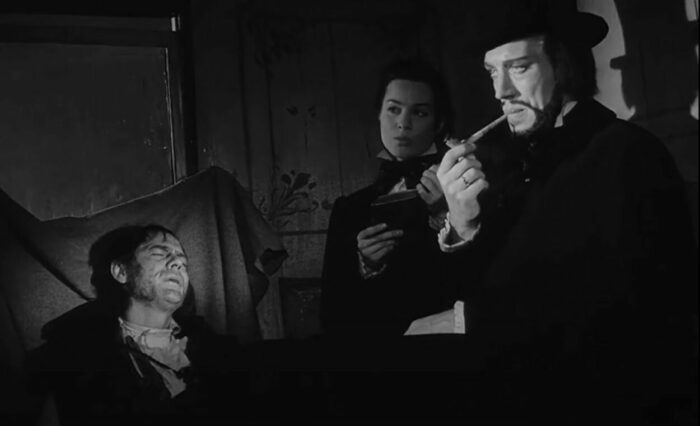
The Magician is often unjustly bypassed when the talk is about Ingmar Bergman’s greatest films, but it certainly warrants a closer look, and greater awareness and appreciation. In this story loosely inspired by G. K. Chesterton’s play Magic: Fantastic Comedy, a travelling troupe of stage magicians, called Vogler’s Magnetic Health Theatre, makes a stop at one rich and aristocratic dwelling of Consul Egerman (Erland Josephson), and it is there that the Egerman family’s scepticism about the supernatural goes head-to-head with the troupe’s claims to hypnosis, conjuring and fortune-telling. Max von Sydow’s fourth collaboration with Bergman sees him in the role of enigmatic, allegedly mute, conjuror Albert Emanuel Vogler, whose dignified attempts at animal magnetism and trickery start to crumble under the discerning eye of the spoiled bourgeoisie.
Just as Bergman’s The Seventh Seal featured a travelling acting troupe in the midst of the Black Death pandemic and his later picture The Rite questioned suspect actors’ artistic intentions, The Magician centres on the plight of one travelling theatre with a lot to prove and much endure in terms of humiliation for few tangible returns. And, as is the case with other films by the Swedish film master, The Magician does not lend itself to easy plot or character analyses, but Bergman’s transportive story-telling, which strikes a seemingly impossible balance between ironic comedy and horror, directional mastery and notable thriller sequence in the film’s final act all make The Magician a memorable viewing experience.
The Prestige (2006)
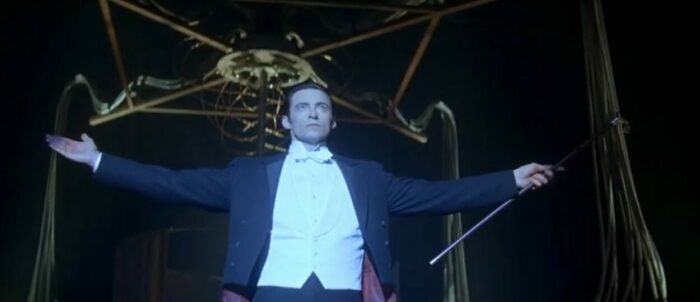
As Christopher Nolan’s new film Oppenheimer is set to become the cinematic highlight of this summer, it is now the perfect time to talk about the director and his filmography. All Nolan’s films shine with narrative complexity, with the director often inviting his audience to take a closer look at his story and even try to piece its elements, and The Prestige is no different. Loosely adapting the book of the same name by Christopher Priest, the film is about two rising stage magicians, Robert Angier (Hugh Jackman) and Alfred Borden (Christian Bale), living in the 19th century London. Though initially friends, Robert and Alfred soon become competitors in trade, wanting to outsmart each other and their audience in the ingenuity of their magic trick inventiveness. The question is then asked: what would a magician would be willing to sacrifice for his art in the hope of becoming the greatest?
With the supporting acting from Michael Caine, Scarlett Johansson, Rebecca Hall, and even David Bowie, The Prestige is one exhilarating cinematic brain-teaser with fine performances, which also raises interesting issues as they relate to science, progress, duality and morality. The film can also be considered twice as smart since the story itself replicates in its structure the main stages of a magic trick as they are presented in the film: 1) the Pledge, 2) the Turn, and 3) the Prestige. In the end, the audience will be fooled, until they realise what they have missed, something tiny, but important, to which they have not really been paying much attention. The Prestige’s thought-provoking structure and complexity once against demonstrate why Nolan’s films lend themselves so well to being re-watched. The audience would want to discover some previously missed film elements or ponder this or that aspect of a Nolan’s film over and over again, and may even find themselves fooled once more, but then also again awed and thrilled.
The Water Magician (1933)
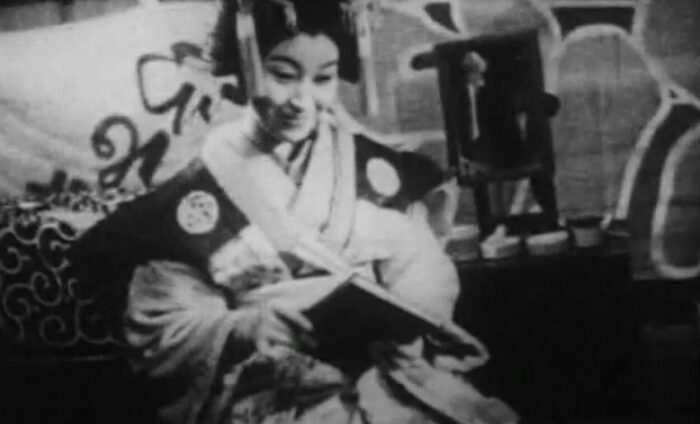
Kenji Mizoguchi may be known as the director of such classic Japanese films as Sansho the Bailiff and Ugetsu, but he also made many silent films, and The Water Magician is one of the few that survived. It adapts the story by Kyōtarō Izumi about Taki (Takako Irie), a prominent water magician, who falls for poor rickshaw driver Kinaya (Tokihiko Okada), who, in turn, wishes to pursue law studies, but has no means of achieving this. Already in love with this stranger and taking pity on him, Taki decides to help him out and sends him to Tokyo, financing his studies. As the time passes, however, Taki’s financial situation worsens and so she believes her hold on her distant beloved. What will she be capable of doing to ensure that Kinaya’s dream comes true and he becomes a lawyer? This is a haunting tale of love and self-sacrifice, which pulls the audience in from its very first scenes showing town Kanazawa giving its welcome to the troupe of skilled artists, including beautiful Taki. The film’s culmination is particularly powerful.
The Illusionist (2010)
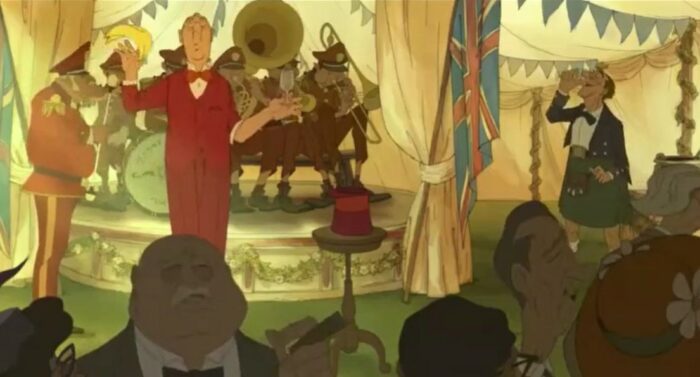
Is hand-drawn animation dead in our digital age? Disney and even the most recent Studio Ghibli animation Earwig and the Witch make us believe so, but there are still plenty of hand-drawn works being released, especially when it comes to small production companies and short animations. Moreover, Hayao Miyazaki’s new animation How Do You Live?, based on the classic YA novel by Genzaburo Yoshino, will almost certainly be hand-drawn. Sylvain Chomet’s 2010 animation The Illusionist, based on Jacques Tati’s unproduced script, showcases the full charm and warmth that can emanate from a hand-drawn material as its story tells of French stage magician Tatishcheff who meets and adopts girl Alice. Their journey takes them to Edinburgh, Scotland where they try to get by on Tatishcheff’s meagre salary. Mostly silent, The Illusionist did gather some controversy, including a letter of protest from Jacques Tati’s grandson, but it is still a stunning animated work that is as entertaining as it is deeply moving.
An Honest Liar (2014)
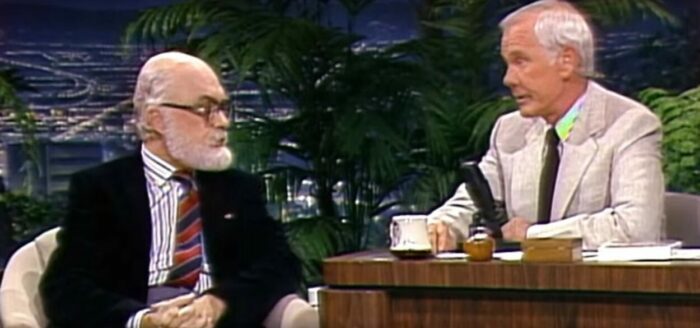
A documentary about magicians can be as exciting as any narrative film, and the thrill of viewing such a film may not reside in making oneself believe in magic, but in following a magician’s journey in disproving it. That is what James Randi (1928-2020), a celebrated magician and escape artist, does in An Honest Liar. Randi always maintained that a special kind of honesty needed to be present in magic trickery, meaning that the public must still be aware that what they see going on in front of them is not some “true magic” or “hypnosis” but a mere skill, often simply sleight of hand. And, there will be plenty of people found who believe in the opposite, in the impossible, in the magic. The documentary follows Randi’s journey to discredit a number of self-proclaimed faith healers, psychics and prophets, who all can do much damage, both personal and societal, in their ultimate goal for popularity and riches. One of Randi’s most notable attempts at discrediting was, of course, his feud with Israeli-British psychic Uri Geller, whose claim to fame was based on his “magical” ability to bend spoons. An Honest Liar, which also touches on Randi’s personal life, is well-made and endlessly eye-opening, and, as paradoxical as it may sound—discrediting magic and promoting scepticism on screen have probably never been as fun to watch.
The Illusionist (2006)
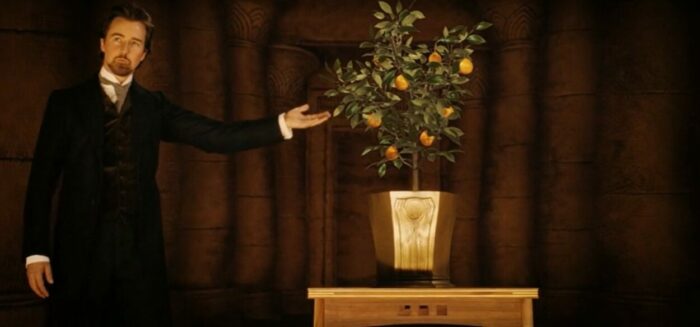
Similar to such film pairs as Kalifornia (1993) and Natural Born Killers (1994), A Bug’s Life (1998) and Antz (1998), and Marguerite (2015) and Florence Foster Jenkins (2016), The Illusionist can also be viewed as a “twin” film of Nolan’s The Prestige and a part of that unofficial series of tied films that happen to revolve around more or less the same theme and be released at around the same time. In this case, director Neil Burger (Limitless) presents the adaptation of Steven Millhauser’s short story Eisenheim the Illusionist, which is about one 19th century stage magician of Vienna by the name of Eisenheim (Edward Norton), whose forbidden love for Duchess Sophie von Teschen (Jessica Biel) leads him to confront her groom, Crown Prince Leopold (Rufus Sewell), a man of allegedly cruel disposition, both on and off stage. Naturally, one of the highlights of the film is all the awe-inspiring magic on display, including the performance of a wondrous illusion known as the “Marvellous Orange Tree”, once known to be staged by French illusionist Jean-Eugène Robert-Houdin. This is a beautiful film about a magician with a compelling love story, exquisite cinematography and an unforgettable twist to boot.
Dealt (2017)
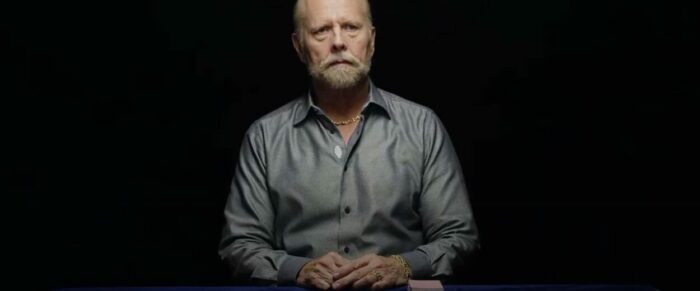
Dealt is a inspiring documentary about Richard Turner (1954-), a renowned American card magician. Although virtually blind since a very young age, Turner never considered himself disabled in any way, and achieved remarkable things with his incomparable sleight of hand card techniques. The story details his early obsession with cards, the development of his talent and skill, his ventures to learn karate, and his struggles with progressive blindness, including the stigma that he faced as a result. We are then taken on Turner’s tours where magic does happen when Turner touches a deck of cards. “Triumph against all odds” documentaries are always special, but Dealt also feels like a very personal journey into a life of obsession, offering an insightful glimpse into the mindset of the world’s greatest card mechanic. If you love card magic, this documentary gem is the one to watch.




